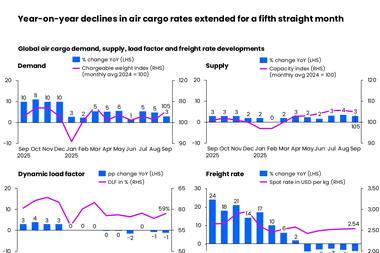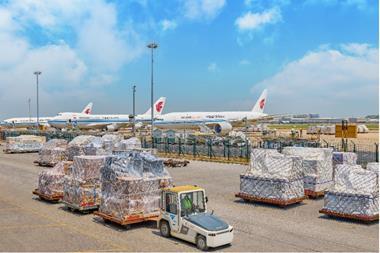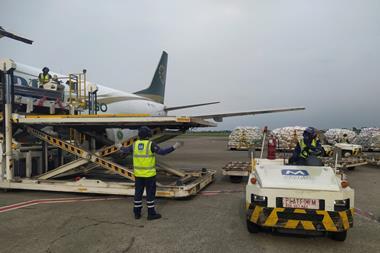My last column for Air Cargo News – the effects of sustainability on capacity and growth – seems like a distant memory.
Sustainability, while still vitally important, is probably not the top priority of the air cargo sector right now, and may not be for many months to come. Right now, we are all aligned in the fight against Covid-19.
Since the end of January, hundreds of thousands of passenger flights have been cancelled in response to government travel restrictions across the globe. With this, cargo capacity tailed off when it was needed desperately to transport vital medicines and medical equipment, such as PPE.
In its place, fleets of freighter aircraft were mobilised to make up this capacity shortfall, and, thanks to the opportunities afforded by these aircraft, air cargo movements have now soared across the UK, with some airports reporting a 400% increase in cargo movements. DHL alone transported 100,000 medical face masks from China to East Midlands Airport this month, providing frontline NHS workers and patients with masks.
In my view, the Covid-19 outbreak is shining a light on the value of the logistics sector, particularly for those who rarely give our work a second thought, and provoking a re-evaluation of how much our economy relies on air cargo to keep our country moving, our pharmacies stocked, our workers safe and our supermarkets full. This can only be a positive thing for the future stability of our sector, at a time when many businesses are having to change the way they operate to move products and parts.
Currently, air cargo carriers are working closely with governments and health organisations around the world to safeguard public health while also keeping the global economy moving. Governments must continue to take urgent action to facilitate air cargo, provide relief for ground handling services, support airports to remain open and allow flexibility and support for crews.
At FTA, we are also keeping the future in mind; swift and efficient recovery will be key for the future stability of the economy and our industry. There is no doubt that aviation will be slower to recover than most, particularly as passenger routes begin to reopen and while health screening and checks are developed and implemented.
Strategies could include flexibility in the furloughing scheme so a gradual return to work for staff can be implemented by airlines, processes to return fleets to operation including support for safety checks and maintenance, and regulatory easements such a continued slot rule relaxation or flexibility and certification extensions as freight movements continue.
In the meantime, we must do all we can to keep our airports open, ground handlers on site, and security operational. Keeping cargo flowing will ultimately save lives, but also maintain the status quo for economies around the world.
Efficient logistics is vital to keep the UK trading, directly having an impact on more than seven million people employed in the making, selling and moving of goods. With Brexit, new technology and other disruptive forces driving change in the way goods move across borders and through the supply chain, logistics has never been more important to UK plc.
FTA is one of the biggest business groups in the UK, supporting, shaping and standing up for safe and efficient logistics. We are the only business group in the UK that represents all of logistics, with members from the road, rail, sea and air industries, as well as the buyers of freight services such as retailers and manufacturers whose businesses depend on the efficient movement of goods.
For more information please visit FTA.co.uk










